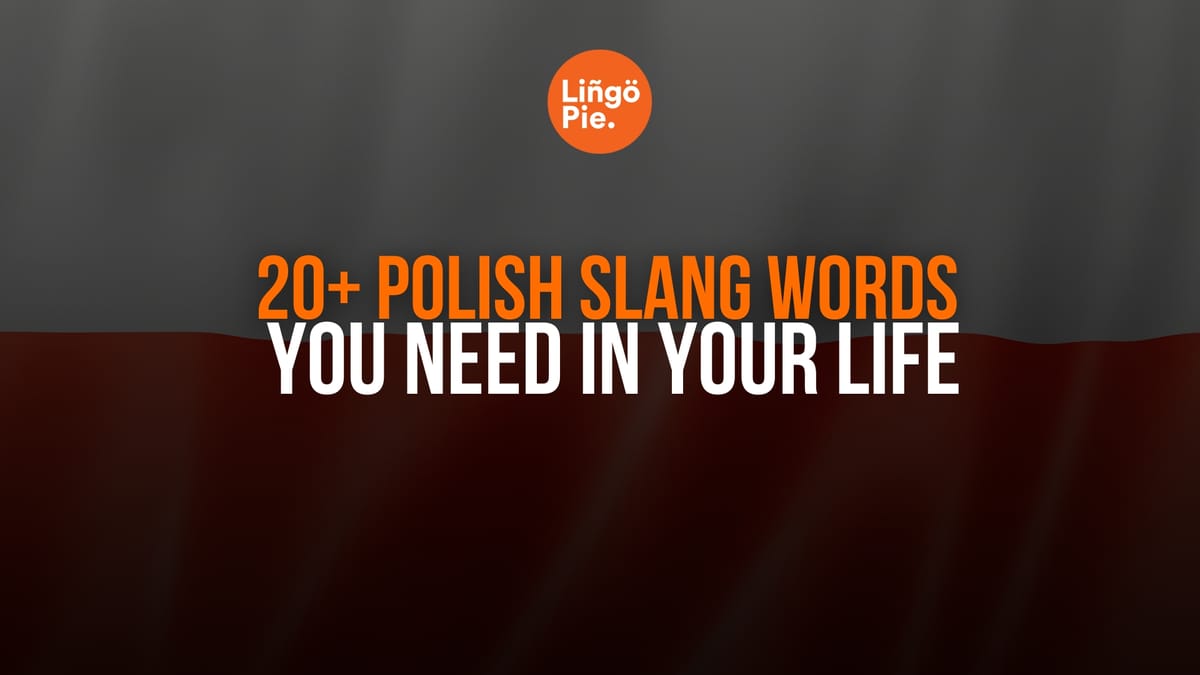Polish slang is way more fun than regular textbook Polish. While formal Polish has all those complicated grammar rules, slang keeps things simple and gets straight to the point. Whether you're hanging out with Polish friends or trying to understand Polish TV shows, these words will help you sound natural instead of like a walking dictionary.
In this post, I'll let you in on the basic Polish slang words you can use with native speakers. With Lingopie soon offering Polish content, you can also expect to hear these words in action and learn Polish naturally.
- 15 French Slang Phrases and Words You Need to Know
- 20+ Popular Irish Slang For St. Patrick’s Day And Beyond
- 20 Super Easy Turkish Slang Words From Locals

Why Learning Polish Slang Matters
Polish slang reflects how people really feel and think. While formal Polish follows strict grammar rules, slang breaks those rules to create more colorful, expressive communication. Learning these words helps you:
- Understand Polish humor (Polish comedy shows suddenly become funny)
- Connect with younger Poles (especially important if you're studying or working in Poland)
- Navigate social situations (know when someone's joking vs. being serious)
- Sound natural instead of like you're reading from a phrasebook
Let's jump into the words you'll actually hear in real Polish conversations.

Common Polish Slang For Daily Life
These words pop up constantly in casual Polish conversation. Master these first as they're your foundation.
Kupa
Pronunciation: KOO-pah
Literal meaning: Shit/poop
Real usage: A lot, tons, or expressing frustration
"Kupa" is probably the most versatile Polish slang word. While it literally means "shit," Poles use it to describe quantity ("mam kupa roboty" = I have tons of work) or express mild frustration ("Och, kupa!" = Oh, crap!). It's casual but not offensive—think of it like "loads" or "tons" in English. You'll hear parents use it, teenagers use it, and even on TV shows. Just don't use it in job interviews.
Spoko
Pronunciation: SPOH-koh
Literal meaning: Calm/peaceful
Real usage: Cool, alright, no worries
"Spoko" comes from "spokojnie" (calmly) but means everything's fine or cool. When someone asks if you're okay with a plan, just say "spoko." When a friend apologizes for being late, say "spoko" to mean no big deal. Polish people use this constantly—it's like the Polish version of "cool" or "no worries." Super safe to use anywhere.
Siema
Pronunciation: SHEH-mah
Literal meaning: (contraction of "jak się masz?" - how are you?)
Real usage: Hey, what's up
This is how Polish young people actually say hello. While textbooks teach "cześć," real conversations start with "siema." It's casual, friendly, and shows you know current Polish. You can respond with "siema" back or add "co tam?" (what's up?). Only use with people your age or younger—older Poles might prefer formal greetings.
Git/Gites
Pronunciation: GEET / GEE-tes
Literal meaning: (from English "good")
Real usage: Good, well done, nice
Polish gamers started using "git" (from English "good"), and now everyone says it. Use it to approve something: "Git!" (Good!), "To jest git" (That's good), or "Git robota" (Good job). "Gites" is the plural/enhanced version—like "very good" or "excellent." Perfect for complimenting someone without sounding too formal.
Essa
Pronunciation: EH-sah
Literal meaning: (slang creation)
Real usage: Cool, awesome
"Essa" is Polish slang for something that's really cool or awesome. It's particularly popular among younger Poles and can be used to express approval or excitement. "Ale essa!" (So cool!) or "Ta muzyka jest essa" (This music is awesome). It's safe to use in casual settings and shows you're up-to-date with current Polish slang.
No
Pronunciation: NO (like English "no")
Literal meaning: No
Real usage: Yes (confusing, right?)
This might break your brain, but Polish slang "no" means "yes." It's super casual and only used with close friends. When someone asks "Idziesz?" (Are you going?), you can answer "No" to mean yes. It's trendy among young Poles but can confuse older generations. Stick to "tak" (yes) in formal situations.
Luzik
Pronunciation: LOO-zhik
Literal meaning: Related to "luz" (loose/relaxed)
Real usage: Chill out, take it easy
When someone's stressed, tell them "na luziku" (take it easy). It's perfect for calming friends before exams or when they're worried about something. Polish students love this phrase—it's like saying "relax" or "don't stress." You'll hear it constantly in universities and casual settings.
Browar
Pronunciation: BROH-var
Literal meaning: Brewery
Real usage: Beer
"Browar" technically means brewery, but Polish people use it casually to mean beer. "Idziemy na browary?" (Shall we go for beers?) or "Daj mi browara" (Give me a beer). It's friendly and informal—you'll hear it in bars, at parties, and among friends hanging out.

Polish Slang For Emotions
These words help you express feelings authentically, the way Polish people actually do.
Bekowy
Pronunciation: BEH-koh-vy
Literal meaning: Related to "bekać" (to laugh/giggle)
Real usage: Hilarious, funny as hell
When something's "bekowy," it's so funny you can't stop laughing. Polish people say this about memes, funny videos, or embarrassing moments. It's stronger than just "funny"—it means genuinely hilarious. "Ale bekowe!" (So hilarious!) is a common reaction to something ridiculously funny.
Sztos
Pronunciation: SHTOS
Literal meaning: (slang creation, no literal meaning)
Real usage: Awesome, amazing, excellent
"Sztos" is Polish Gen Z's favorite word for anything impressive. Cool outfit? Sztos. Great movie? Sztos. Amazing experience? Sztos. It's completely positive and safe to use with anyone. Polish young people say it constantly—it's like "awesome" or "sick" (in the good way) in English.
Odlot
Pronunciation: OD-lot
Literal meaning: Flight/departure
Real usage: Mind-blowing, incredible
"Odlot" means something's so amazing it's unreal—like it "flew away" from normal. Use it for truly exceptional experiences: concerts, achievements, or surprises that leave you speechless. It's stronger than "sztos" and shows you're genuinely impressed.
- 9 Chinese Jokes That Made Me Feel Fluent In Chinese
- Swiss German And German Language: 5 Major Differences
- 11+ Best Shows On Netflix To Learn Korean

Polish Slang for Objects and People
Polish creativity shines when describing people and everyday objects.
Laska
Pronunciation: LAHS-kah
Literal meaning: Stick/cane
Real usage: Attractive woman/girl
Polish guys use "laska" to refer to an attractive woman, like "chick" in English. Be careful—some women find it objectifying. It's casual guy talk, not something you'd use directly to a woman you just met. Context matters a lot with this one.
Typ/Typka
Pronunciation: TIP / TIP-kah
Literal meaning: Type
Real usage: Guy/girl (neutral)
These neutral terms work for anyone: "Ten typ" (that guy), "Ta typka" (that girl). It's like saying "dude" or "person" in English—informal but not disrespectful. Much more casual than formal "mężczyzna/kobieta" (man/woman).
Kasa
Pronunciation: KAH-sah
Literal meaning: Cash register
Real usage: Money
"Kasa" means money in Polish slang. "Mam dużo kasy" (I have lots of money), "Brak kasy" (No money). It's extremely common—more popular than formal "pieniądze" in casual conversation. Everyone uses it, from teenagers to adults.
Fura
Pronunciation: FOO-rah
Literal meaning: Wheelbarrow
Real usage: Fancy car
Polish people call their cars "fura," especially when talking casually. "Moja fura jest stara" (My car is old), "Jedziemy jego furą" (We're going in his car). It's friendly and informal—much more relatable than formal "samochód."
Ziomek/Ziomuś
Pronunciation: ZHYO-mek / ZHYO-moosh
Literal meaning: (from "ziemia" - earth/land)
Real usage: Buddy, homie, mate
"Ziomek" is the Polish version of "buddy" or "homie," originally meaning someone from your area or neighborhood. "Ziomuś" is the affectionate, diminutive form. "Co tam, ziomek?" (What's up, buddy?) Use it with friends to show closeness and camaraderie. This word comes from "ziemia" (earth), suggesting someone who shares your "ground" or homeland.
Banan
Pronunciation: BAH-nan
Literal meaning: Banana
Real usage: Rich, spoiled kid
"Banan" describes a wealthy, spoiled kid—usually someone who shows off their money. "On to taki banan" (He's such a spoiled rich kid). It implies someone who's privileged and acts entitled because of their family's wealth. The term suggests someone who's "soft" or "yellow" like a banana—spoiled and lacking substance.

Polish Internet and Social Media Slang
Polish internet culture uses a mix of adapted English terms, Polish abbreviations, and gaming-originated words. These terms show up constantly in Polish social media, texting, and online gaming.
Nwm
Pronunciation: EN-veh-em (spelled out as letters)
Literal meaning: Nie wiem (I don't know)
Real usage: I don't know / IDK
Polish internet users type "nwm" as a quick way to say "nie wiem" (I don't know). You'll see it everywhere online—Facebook comments, text messages, gaming chats. It's the Polish version of "idk" and saves typing time. When someone asks a question you can't answer, just respond "nwm" and everyone understands.
Mem/Memy
Pronunciation: MEM / MEH-my
Literal meaning: Meme/memes
Real usage: Meme(s), funny internet content
Polish internet adopted "meme" as "mem" (singular) and "memy" (plural). Polish social media is full of original "memy" that mix international meme formats with Polish humor and cultural references. Saying "ale dobry mem!" (what a good meme!) shows you're part of Polish internet culture.
Elo
Pronunciation: EH-lo
Literal meaning: (from gaming "Elo rating" system)
Real usage: Hi/hello (online greeting)
"Elo" started in Polish gaming communities but spread to general online communication. It's a casual way to say hello that's more relaxed than "cześć." Polish gamers and young internet users favor this greeting in chat rooms, Discord servers, and social media comments.
LOL
Pronunciation: EL-oh-EL (pronounced as letters)
Literal meaning: Laugh out loud
Real usage: Funny/amusing (often used)
Polish internet users adopted "LOL" but pronounce it as individual letters "el-o-el." It's incredibly common in Polish online communication—more so than the Polish equivalent "haha." You can use it exactly like in English to show something is funny or amusing.
Cringe/Krindż
Pronunciation: KREENG / KRINJ
Literal meaning: Embarrassing/awkward
Real usage: Secondhand embarrassment, awkward content
Polish internet uses both "cringe" (keeping English spelling) and "krindż" (Polish phonetic spelling) for content that makes you uncomfortable. "To jest cringe" (That's cringe) or "krindżowy filmik" (cringe video) are common reactions to awkward TikToks or embarrassing social media posts.
Fanpage/Fanpejdż
Pronunciation: FAN-page / fan-PAYZH
Literal meaning: Fan page
Real usage: Social media fan page
Polish internet uses "fanpage" or the Polish-adapted "fanpejdż" for social media fan pages. These might be for celebrities, brands, or content creators. "Lajknij nasz fanpage" (like our fanpage) is common social media speak in Poland.
Hater/Hejter
Pronunciation: HAY-ter / HEJ-ter
Literal meaning: Hater
Real usage: Someone who dislikes/criticizes online
Polish adapted "hater" to "hejter" (following Polish spelling rules). Online content creators often mention their "hejterzy" (haters) or complain about "hejt" (hate) they receive. It's used exactly like in English but with Polish pronunciation.
Ready To Master Polish Slang?
Learning slang from lists is one thing—but hearing it used naturally in real conversations? That's where real learning happens. With Lingopie's Polish content coming soon, you'll:
- Hear slang in context - finally understand when "no" means "yes"
- Learn real pronunciation - discover how Poles actually say these words
- Pick up cultural nuances - know when "sztos" is appropriate vs. formal Polish
- Stay current - catch the latest slang as it evolves in real time
Polish textbooks teach you to order coffee politely, but Lingopie teaches you to joke around with the barista. That's the difference between speaking Polish and actually speaking Polish.
Frequently Asked Questions About Polish Slang
Can I use Polish slang with older people?
Use Polish slang carefully with older Polish people—stick to mild words like "spoko" or "git" rather than stronger terms. Many older Poles prefer formal language and might not understand newer slang expressions. Always observe their language style first and follow their lead.
How do I know when Polish slang is appropriate?
Polish slang is perfect for casual conversations with friends, peers, and younger people. Avoid slang in formal situations like job interviews, talking to bosses, or meeting parents for the first time. When in doubt, use formal Polish—it's always safer than slang in professional settings.
Where can I practice Polish slang safely?
Practice Polish slang with Polish friends, language exchange partners, or in casual social media interactions. Online gaming communities and Polish social media groups are great for seeing slang in action. Start by observing how natives use these words before jumping in yourself.
Should I learn Polish slang before mastering formal Polish?
Master basic Polish grammar and vocabulary first, then gradually add slang to sound more natural. Slang won't help if you don't understand fundamental conversation structure. Think of slang as seasoning—it makes Polish conversations more flavorful, but you need the main dish (formal Polish) first.






![I Love You In Polish: Romantic Phrases You Need To Know [2026]](/blog/content/images/size/w300/2026/02/I-Love-You-In-Polish.png)
![How To Say Happy New Year In Polish [15+ Useful Words]](/blog/content/images/size/w300/2025/12/how-to-say-happy-new-year-In-polish.jpeg)

